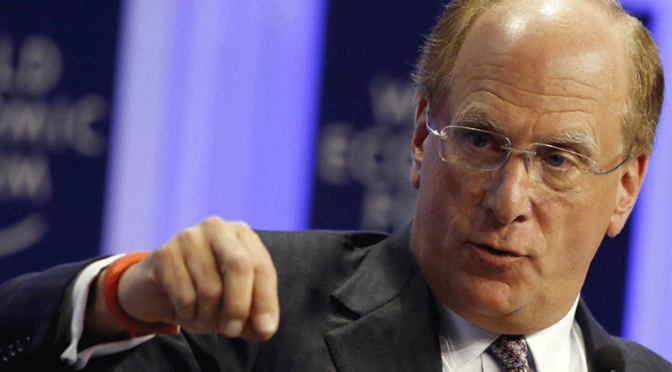Ukraine has a new Western backer. It’s not a nation-state, or a military contractor. It’s the financial firm BlackRock.
Ukraine announced Wednesday that Ukrainian President Volodymyr Zelensky had a video teleconference with BlackRock Chief Executive Officer Larry Fink. The pair apparently struck a deal to coordinate investment efforts to rebuild the war-torn nation.
A readout of the meeting on the Ukrainian president’s website boasted BlackRock’s involvement, calling the firm “one of the world’s leading investment managers” and noted that it “manages client assets worth about 8 trillion dollars.”
“Zelenskyy and Larry Fink agreed to focus in the near term on coordinating the efforts of all potential investors and participants in the reconstruction of our country, channelling investment into the most relevant and impactful sectors of the Ukrainian economy,” the readout claimed.
The release also stated that some BlackRock executives would visit Ukraine in 2023 to fulfill their advisorial duties.
“In accordance with the preliminary agreements struck earlier this year between the Head of State and Larry Fink, the BlackRock team has been working for several months on a project to advise the Ukrainian government on how to structure the country’s reconstruction funds,” according to the Ukrainian government.
One such preliminary agreement struck between BlackRock and Ukraine was a memorandum of understanding signed by the Ukrainian Ministry of Economy and BlackRock Financial Markets Advisory in Washington, D.C., on November 10, 2022. The memo said that BlackRock FMA would advise the Ukrainian government, specifically the Ministry of Economy, on an investment roadmap for the reconstruction of Ukraine’s economy.
BlackRock’s press release about the November 10 memo is chock full of hollow corporate speak. According to the release, BlackRock will work with Ukraine “on establishing a roadmap for the investment framework’s implementation, including identifying design choices for the envisioned setup, structure, mandate and governance.”
A previous meeting in September between Zelensky and Fink, apparently arranged by Andrew Forrest of the Fortescue Metals Group, laid the groundwork for the Ukrainian government’s growing cooperation with BlackRock. The Ukrainian President and the BlackRock CEO reportedly discussed how to attract public and private investment to Ukraine.
Back in the states, the NYC-based investment firm has been making major headlines. A report from the Wall Street Journal over the summer claimed BlackRock was one of several major investment firms causing distortion in the housing market. The report laid out how BlackRock, and firms like it, are using their massive amounts of capital to buy up single-family houses, jacking up prices in the process.
There are two immediate economic effects of the aforementioned price increases. First, higher housing costs benefit the properties already owned by BlackRock, especially in areas where the firm has invested heavily.
The second effect is the artificially high prices crowd out working families, leaving only the wealthy or investment firms with massive amounts of capital at their disposal as the only players left in the market.
In Houston, for example, the billionaire Fink reportedly accounts for one-quarter of recent home purchases. He’s simply buying up entire neighborhoods and using them as rentals. BlackRock is helping create a permanent renters class, though it’s long been understood that homeownership is one of the key elements to building wealth and maintaining the American middle class.
It is all rather infuriating: one can almost guarantee BlackRock is getting paid handsomely by the Ukrainian government for advising on this reconstruction roadmap. And where is the Ukrainian government currently getting its funding, given its economy is in shambles and war is an expensive undertaking?
The United States government, of course. By the end of the calendar year, the U.S. will have provided $13 billion in direct budgetary support for Ukraine’s government to avoid shortfalls and outright bankruptcy, and President Joe Biden has promised to support Ukraine for “as long as it takes.”
So, BlackRock gets paid by U.S. taxpayers via the Ukrainian government to devise a plan that ensures the success of their future investments in Ukraine, made from money gained by making American housing unaffordable. With a deal like that for our financial and political elite, why would they ever want peace?



In the past the Marshall Plan which was mainly based on U.S. taxpayers monies was justifiably used by the US government to rebuild a World War II devestated Western Europe that helped welfaristic democracies therein while raising living standards back home. This time around US taxpayers monies together with U.S. debts are again proposed to be used rather misused to reconstruct and rebuild a proxy-war ruined Ukraine and perhaps also Eastern Europe that may merely create captive clients for the seemingly “public”-PRIVATE capitalist monster BlackRock under the vaneer of a corporatised “nation” state while fleecing and marginalizing the U.S. middle and lower classes respectively. Clearly this would be a Marshalled plan for Eastern Europe then if left unaudited by American and International regulators assuming of course that there are such truely independent entities out there !
Black Rock arise as rapidly as the Rothschilds and I’ll bet are basically s twin organisation fronting for the exact same backers. I’m pretty sure the names the clue since the Shriners only allow the Koran as their chosen book.
When extreme wealth is concentrated on the few, corruption knows no bounds.
Accumulation of wealth per se shouldn’t be criminalized. What needs to be scrutinized and also penalized is more the unproductive hoarding of wealth to the detriment of universal human and social uplift. For this a naming and shaming global database has to be established and uniform wealth ceiling must be enforced !